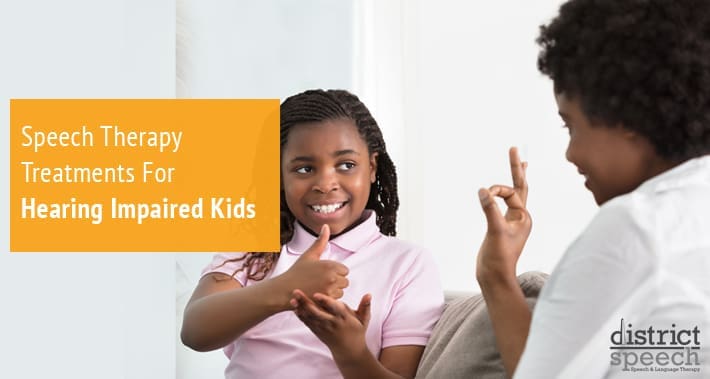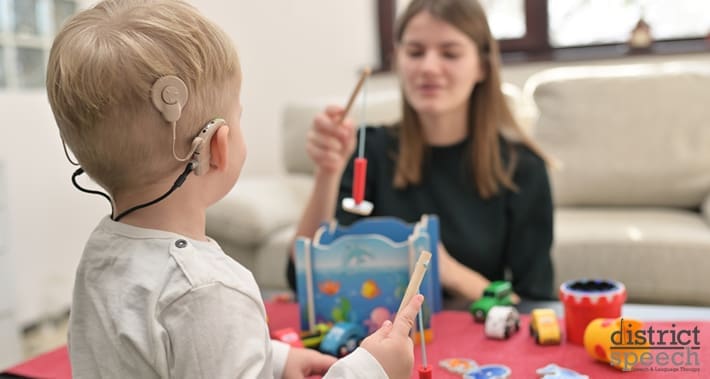
When a child learns to speak, it’s an exciting developmental milestone for parents.
The first time your child says “mama” or “dada” is a time for parents to feel great pride and joy.
If your kid doesn’t start to speak according to expected timelines, there can be cause for worry.
One reason for not speaking when expected could be due to hearing impairment.
We’re District Speech, a children’s speech therapist clinic serving Washington DC and area, and if your child isn’t meeting expected timelines for speaking, we can help.
We are able to assess the reasons for your child’s delayed speech and offer interventions to help get them back on track.
Keep reading to learn more.
What Is Hearing Impairment?
Hearing impairment or hearing loss is when there is a problem with a child’s hearing.
This can range from mild to extreme.
Hearing loss can impact a variety of areas including:
- Social skills, making it difficult to make friends
- Reading and other skills development which can affect school performance
- Delayed speech and language development
- Poor self image and/or mental health
If your child has mildly impaired hearing, they’re probably able to understand the big picture of what people are saying to them.
However, they might miss small details.
They may also have more trouble concentrating in a noisy environment.
If your child is deaf, on the other hand, they are not able to hear anything at all.
Hearing loss can range anywhere from mildly impaired to complete deafness.
How Does Hearing Impairment Affect Speech Development?
Being able to hear others speak is a large part of how children learn to speak themselves.
If a child isn’t able to hear the adults in their life speak, it can have an impact on their speech milestone development.
Some sounds can be more difficult for children with hearing loss to hear, for instance “th”, “s”, “sh” and “t”.
All these sounds are used frequently in the English language.
This means that not being able to hear them can result in trouble hearing the syllables they are part of.
It also results in difficulty understanding those around them and even following directions.
How Can A Speech Therapist Help With Hearing Loss?
If your child is having speech delays due to hearing loss, a speech therapist can help them learn to speak clearly and develop their listening skills.
Goals of speech therapy for children with hearing loss include:
- Early diagnosis of hearing loss or impairment
- Learning to use hearing devices
- Helping the child gain confidence and independence
- Having parents and other caregivers participate in treatment
Keep reading for more information on some of the ways a speech therapist can help children with hearing impairments.

1. Deciding On A Sound Amplification Device
The technology behind devices to help amplify hearing is constantly improving.
A licensed audiologist can help you determine the best type of amplification device and help make sense of the options.
For instance, they can help you understand the difference between hearing aids and cochlear implants, and the best situations to use each.
Your speech therapist may advise you what they think may be beneficial, and from there can refer you to an audiologist.
Often, while audiologists will help you find the best device for you, they don’t show you how to use it or maintain it.
That’s where your speech therapist really comes into the picture.
They can help your child with their adjustment to the device.
Once your child has adjusted, their speech therapist can help them continue to develop their language skills and understand how to maintain their device.
2. Deciding On Speech Vs. Sign Language
The question of whether to use speech or sign language is a very personal and individual one which each family will need to consider.
Some will choose solely a speech or auditory-verbal approach, others may opt for sign language only.
When using an auditory approach, children are not taught to use visual cues such as sign language.
Listening skills are heavily emphasized, as children learn to speak by listening to those around them.
This approach may not work as well for children with extreme hearing loss.
Families who use a sign language only approach will teach the child to communicate using sign language exclusively.
This is common for families with deaf parents or caregivers and is mostly used within the Deaf community.
If you can’t speak sign language, a speech therapist can also help you learn the language alongside your child.
This would include strategies for using sign language at home to encourage the immersion of both yourself and your child.
However, everyone’s needs are different.
Your child’s speech therapist can help you choose the best option for your unique situation.
3. Other Speech Therapy Solutions
There are a number of approaches to helping children with hearing impairments.
Usually, these are considered combination approaches.
Combination approaches typically include aspects of both speech and visual cues, like sign language.
These kinds of approaches can also include other types of AAC like pictures or, if your child is old enough, written language.
There is also something called simultaneous communication, which may be a beneficial option for your child.
Simultaneous communication is when spoken language and sign language are used together.
This method can be very helpful because it provides your child with both auditory and visual cues to follow.
However, using this method of communication with your child can cause them to struggle with grammar.
This happens because English and American Sign Language have different grammatical structures.
If you are signing the words that you speak verbatim, your grammar will be incorrect by American Sign Language standards.
If you are speaking what you sign verbatim, your grammar will be incorrect by spoken English standards.
While some people can sign or speak interpretively between language, this requires fluency and in depth knowledge of both languages.
This level of fluency often isn’t the case for children who have hearing impairments and are learning to speak.
However, that’s not a reason to discount this method entirely.
What’s really important is that your child can communicate with you in a way that’s comfortable for them and you.
Another method is called “total communication”.
This is similar to simultaneous communication, except it doesn’t just stop at speech and sign.
Total communication also uses tools like media, pictures, and other technology.
The idea is to use “any means necessary” to be able to communicate.
The benefit to total communication is that it ensures messages are clear and accessible.
Book Your Appointment With District Speech Today
Are you worried your child is showing signs of hearing impairment?
Do you have concerns because they aren’t developing speech at the same rate as their peers?
Early intervention is especially important in these cases to help them learn to speak and communicate with the world around them.
We’re District Speech, professional speech therapists serving Washington DC and surrounding area.
One of our experienced and professional speech therapists can assess the extent of hearing impairment and help develop a plan to address any issues.
Book your appointment with District Speech today.
1300 I St NW, Suite 400 E,
Washington, DC 20005
- https://g.page/districtspeech
District Speech and Language Therapy specializes in speech therapy, physical therapy, and occupational therapy solutions, for both children and adults, in the Washington D.C and the Arlington Virginia areas.